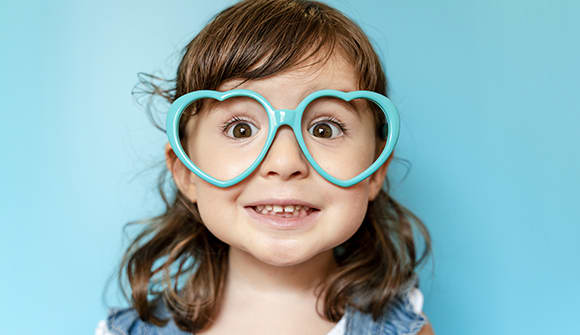Time for four eyes?
Clues your child may need glasses.
Article Author: Juliette Allen
Article Date:

If you’ve noticed your child is having a hard time concentrating at school or frequently has headaches at the end of the day, did you know poor eyesight may be to blame?
Vision disorders are considered to be the most common disabling condition of childhood, according to April Brenes, MD, a pediatrician with Baptist Pediatrics. An estimated 20% of children develop a refractive error – a type of eye problem that results in blurry vision – requiring glasses by adolescence.
“Normal visual development requires that both eyes see the same exact image,” Dr. Brenes said. “When the eyes do not see the same exact image, they cannot give the image to the brain correctly. This can lead to one eye being dominant and the other being ignored or ‘lazy.’ Left untreated, this can cause irreversible visual loss that cannot be corrected by glasses.”
Screening time
While poor eyesight can occur at any age, some risk factors for vision problems include:
- Family history of vision disorders
- Prematurity
- Low birth weight
- Drooping eyelids
Dr. Brenes cautioned that early childhood is a critical time for visual development, which is why it’s important to begin screening before the age of 6-10. Pediatricians should screen the visual axis, which is essentially the line of sight, at all well-child visits.
“As an infant and young child, a light is used to see the red reflex to make sure it is equal,” she said. “It is also used to see the corneal light reflex that should also be equal on both eyes. We make sure the eyes are moving together and that they can fixate on an object. As the child gets older, we rely on visual screening charts.”
See the signs
Parents should discuss eye screening with their pediatrician if they notice their child doing any of the following:
- Squinting
- Tilting the head or covering one eye
- Sitting too close to the TV or holding an electronic device close to the face
- Rubbing the eyes frequently
- Complaining of headaches or eye pain at the end of the day
- Crossing the eyes
- Appearing to have cloudy eyes
- Having difficulty concentrating on schoolwork or struggling to read
While it can be concerning if a child shows signs of poor eyesight, parents should rest assured knowing the vast majority can be managed with some fancy new frames.
A pediatrician can determine whether a child should see an eye specialist for a comprehensive eye exam. To find the right pediatrician for your family, call 904.202.4YOU.



